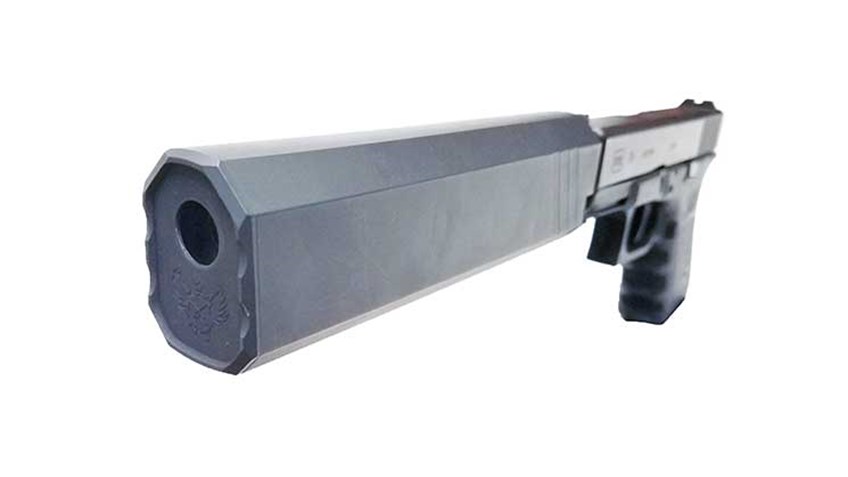by Guy J. Sagi – Monday, February 13, 2017
The Hearing Protection Act of 2017—H.R. 367, introduced by Rep. Jeff Duncan (R-SC) and John Carter (R-TX)—resurrects a 2015 proposal by then-Arizona Rep. Matt Salmon to ease suppressor ownership restrictions on law-abiding citizens.
For more than 80 years, suppressors have been exiled to a list of National Firearms Act (NFA) items created in 1934—when Franklin Delano Roosevelt was in the White House. Ownership of suppressors is generally legal, but qualifying to take one home requires onerous and time-consuming requirements such as, but not limited to, fingerprints, photographs, notifying your local chief law enforcement officer, a background check and a $200 tax stamp.
The Hearing Protection Act, in simplest terms, aims to eliminate the tax stamp and effectively reduce the six-to-nine-month wait—in the 42 states where ownership is legal—by requiring only a NICS background check and a 4473. The bill, as currently written, also refunds money to those who started the purchase process while legislation was pending. It sounds like an easy victory, considering the current administration, but it’s too early to put this one in the win column.
The ground game is ongoing, with the latest proposals—H.R. 367 and S.R. 59 (Sen. Mike Crapo, R-ID, co-sponsored by Jerry Moran, R-KS, and Rand Paul, R-KY)—introduced on Jan. 9, 2017. Both would remove suppressors from NFA listing, and they have garnered 97 and 7 co-sponsors, respectively.
The House version has been referred to the Subcommittee on Crime, Terrorism, Homeland Security and Investigations. Ten Republicans and 7 Democrats make up the current membership, though, it’s particularly good news when coupled with the number of sponsors and the fact the entire voting body of the House has 435 members with 240 of them Republican.
The Senate side, on the other hand, is where firearm owners are getting mixed signals about the certainty of the Hearing Protection Act passage. If enough senators decide more debate is due, they can filibuster and the only way to bring the measure to a vote is called cloture. That requires 60 of the 100 members to vote in favor of legislation being considered—not a simple 51 vote majority if anti-Second Amendment legislators mount the defense.
With a total of 52 Republicans, two independents and 46 Democrats in the U.S. Senate, there might not be enough to pull off a successful vote. Add the relatively low number of co-sponsors, and the assumption that suppressors will be removed from the NFA any time soon is premature.
Even legislation that’s overwhelmingly popular takes time given the legislative process. After legislation is introduced, there will be hearings, mark-ups, amendments and other legislative hurdles in both the Senate and House. In the 113th Congress, for example, the average time it took from introduction to signature into law by the president was slightly more than 263 days. Many took longer. In fact, it took more than five years to pass the Protection of Lawful Commerce in Arms Act that prohibits reckless lawsuits against the firearms industry seeking to hold firearms and ammunition manufacturers responsible for the acts of criminals.
Then there’s availability. Suppressor companies, even the big ones, don’t have the supply chain or manufacturing capacity of big firearm firms. So, if you wait to see what happens, you’d better be resigned to wearing hearing protection for at least the next few years. This one-on-one interview with SilencerCo CEO Josh Waldron and Donald Trump, Jr. provides some eye-opening numbers and makes it obvious there is going to be a huge gap in supply if the measure passes. “It’s going to be like the run on .22LR ammunition,” he said.
So, if you’re considering buying a suppressor but are holding off until the HPA passes, my advice is to go ahead and buy it. We all know Congress isn’t known for it’s speedy consideration of legislation, and there’s no guarantee that it will pass in the near future. The current legislation’s wording would also refund your tax-stamp money, so there may never be a better time to buy.
NRA-ILA is reminding members and enthusiasts to contact their representatives by phone, writing and e-mail to let them know they need to support the Hearing Protection Act. The Trump administration’s overwhelming support has lulled some into a false sense of victory, making action critical.
“Gun owners and sportsmen should be able to enjoy their outdoor heritage with the tools necessary to do so safely,” NRA-ILA Executive Director Chris Cox said. “This bill makes it easier for them to do that.”


